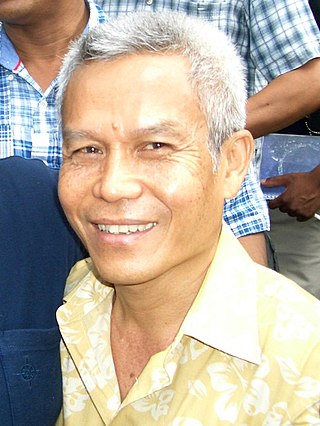
An enforced disappearance is the secret abduction or imprisonment of a person with the support or acquiescence of a state followed by a refusal to acknowledge the person's fate or whereabouts with the intent of placing the victim outside the protection of the law. Often, forced disappearance implies murder whereby a victim is abducted, may be illegally detained, and is often tortured during interrogation, ultimately killed, and the body disposed of secretly. The party committing the murder has plausible deniability as there is no evidence of the victim's death.
The World Organisation Against Torture is the world's largest coalition of non-governmental organisations fighting against arbitrary detention, torture, summary and extrajudicial executions, forced disappearances and other forms of violence. With more than 200 affiliated organisations in its SOS-Torture Network, the OMCT aims at accompanying, reinforcing and protecting anti-torture organisations in particular in erosive environments and provides a comprehensive system of support and protection for human rights defenders around the world. The global network consists of local, national and regional organisations, which share the goal of eradicating torture and fostering respect of human rights for all.

The Human Rights Commission of Pakistan (HRCP) is an independent, democratic non-profit organisation. Founded in 1987, it is one of the oldest human rights organisations in the country.
The International Day of the Disappeared, on August 30 of each year, is a day created to draw attention to the fate of individuals imprisoned at places and under poor conditions unknown to their relatives and/or legal representatives. The impulse for the day came from the Latin American Federation of Associations for Relatives of Detained-Disappeared (Federación Latinoamericana de Asociaciones de Familiares de Detenidos-Desaparecidos, or FEDEFAM), a non-governmental organization founded in 1981 in Costa Rica as an association of local and regional groups actively working against secret imprisonment, forced disappearances and abduction in a number of Latin-American countries.
The Vienna Declaration and Programme of Action (VDPA) is a human rights declaration adopted by consensus at the World Conference on Human Rights on 25 June 1993 in Vienna, Austria. The position of United Nations High Commissioner for Human Rights was recommended by this Declaration and subsequently created by General Assembly Resolution 48/141.

Human rights in Eritrea are viewed, as of the 2020s, by non-governmental organisations (NGOs) such as Human Rights Watch as among the worst in the world, particularly with regards to freedom of the press. Eritrea is a one-party state in which national legislative elections have been repeatedly postponed, the judiciary is weak, and constitutional provisions protecting individual freedom have yet to be fully implemented. Some Western countries, particularly the United States, accuse the government of Eritrea of arbitrary arrest and detentions and of detaining an unknown number of people without charge for their political activism. Additionally, Eritrean citizens, both men and women, are forcibly conscripted into the military with an indefinite length of service and used as forced labour.

Human rights are largely respected in Switzerland, one of Europe's oldest democracies. Switzerland is often at or near the top in international rankings of civil liberties and political rights observance. Switzerland places human rights at the core of the nation's value system, as represented in its Federal Constitution. As described in its FDFA's Foreign Policy Strategy 2016-2019, the promotion of peace, mutual respect, equality and non-discrimination are central to the country's foreign relations.

Asociación de FAmiliares de PREsos y DEsaparecidos SAharauis (AFAPREDESA), is an exile-based Sahrawi human rights organization, campaigning against human rights abuses perpetrated by Morocco against Sahrawi people in Western Sahara and even Morocco itself. It focuses especially on the question of the Sahrawi "disappeared", and had campaigned extensively in the past for the release of political prisoner Muhammad Daddach. It is the only Sahrawi human rights Non-governmental organization officially recognized by the Sahrawi Arab Democratic Republic. Due to this, it is banned in the Moroccan government-controlled part of Western Sahara, operating there clandestinely.
The International Service for Human Rights (ISHR) is an independent, non-profit organization with offices in Geneva and New York which promotes and protects human rights by supporting human rights defenders, strengthening human rights standards and systems, and leading and participating in coalitions for human rights change.

The International Convention for the Protection of All Persons from Enforced Disappearance (ICPPED) is an international human rights instrument of the United Nations intended to prevent forced disappearance, which, as defined in international law, is part of crimes against humanity. The text was adopted by the United Nations General Assembly on 20 December 2006 and opened for signature on 6 February 2007. It entered into force on 23 December 2010. As of April 2023, 98 states have signed the convention and 71 have ratified it.
Colombia is a sovereign state situated in South America. It has been a member of the United Nations since 5 November 1945, and is party to a variety of international agreements concerning human rights. It also has a series of domestic laws concerning the protection of human rights. However, Colombia's human rights record often contradicts directly with the laws and agreements to which it is bound; Colombia was referred to as the country with the "worst human rights record in the western hemisphere," by HRW in 2007. The same was said of Guatemala in 1998, as well as Cuba in 2012 and Venezuela today. In the UK Foreign Office annual human rights report for 2010, Colombia features as one of 20 "Countries of Concern".
Uzbekistan is a source country for women and girls who are trafficked to the United Arab Emirates (U.A.E.), Kazakhstan, Russia, Thailand, Turkey, India, Indonesia, Israel, Malaysia, South Korea, Japan and Costa Rica for the purpose of commercial sexual exploitation. Men are trafficked to Kazakhstan and Russia for purposes of forced labor in the construction, cotton and tobacco industries. Men and women are also trafficked internally for the purposes of domestic servitude, forced labor in the agricultural and construction industries, and for commercial sexual exploitation. Many school-age children are forced to work in the cotton harvest each year.
Yakay-Der is a Turkish activist group. It was founded on 9 March 2001 to help the families of disappeared Kurds in Turkey.
Alkarama is an independent Swiss-based human rights non-governmental organization established in 2004 to assist all those in the Arab World subjected to, or at risk of, extrajudicial killings, disappearances, torture, and arbitrary detention. Acting as a bridge between individual victims in the Arab World and international human rights mechanisms, Alkarama works towards an Arab World where all individuals live free, with dignity, and protected by the rule of law.

ECPAT International is a global network of civil society organisations that works to end the sexual exploitation of children. It focuses on ending the online sexual exploitation of children, the trafficking of children for sexual purposes, the sexual exploitation of children in prostitution, child, early and forced marriages, and the sexual exploitation of children in the travel and tourism industry.

Sombath Somphone is an internationally acclaimed community development worker and prominent member of Lao civil society. Sombath was abducted from a Vientiane street in 2012 and has not been seen since.

International Coalition to End Torture is a non-governmental organisation focused on raising awareness of human rights and the United Nations Convention Against Torture around the world by knowing them, demanding them, and defending them. The objective of the organisation is to bring "like-minded individuals from all walks of life, all disciplines, races, creeds and nationalities and allied organizations to bring the full force of unity to bear in the human rights arena.

Forced disappearance in Pakistan originated during the military dictator General Pervez Musharraf. The practice continued during subsequent governments. The term missing persons is sometimes used as a euphemism. According to Amina Masood Janjua, a human rights activist and chairperson of Defence of Human Rights Pakistan, there are more than 5,000 reported cases of forced disappearance in Pakistan. Human rights activists allege that the law enforcement agencies in Pakistan are responsible for the cases of forced disappearance in Pakistan. However, the law enforcement agencies in Pakistan deny this and insist that many of the missing persons have either joined militant organisations such as the TTP in Afghanistan and other conflict zones or they have fled to be an illegal immigrant in Europe and died en route.

Human rights in the Dominican Republic constitute the civil and political rights and freedoms legally protected under the Constitution of the Dominican Republic and enforced by the government through common and statutory law. The majority of human rights disputes are presided over by the highest court of constitutional appeal, the Dominican Constitutional Tribunal. These rights and freedoms have developed over time in accordance with the Dominican Republic's expansion from the former Spanish colony of the Captaincy General of Santo Domingo to its modern state formation. The history of human rights in the state have also been marked by the oscillation between democratic administrations, such as the current presidency of Danilo Medina, and authoritarian administrations, most significantly the dictatorial regime of Rafael Trujillo between 16 August 1930 and 16 August 1938. As a member of the Organization of American States and the United Nations, the Dominican Republic is party to myriad legal treaties and covenants which propagate the human rights standards of the international community and have integrated the majority of these human rights directives into their domestic legislation.











